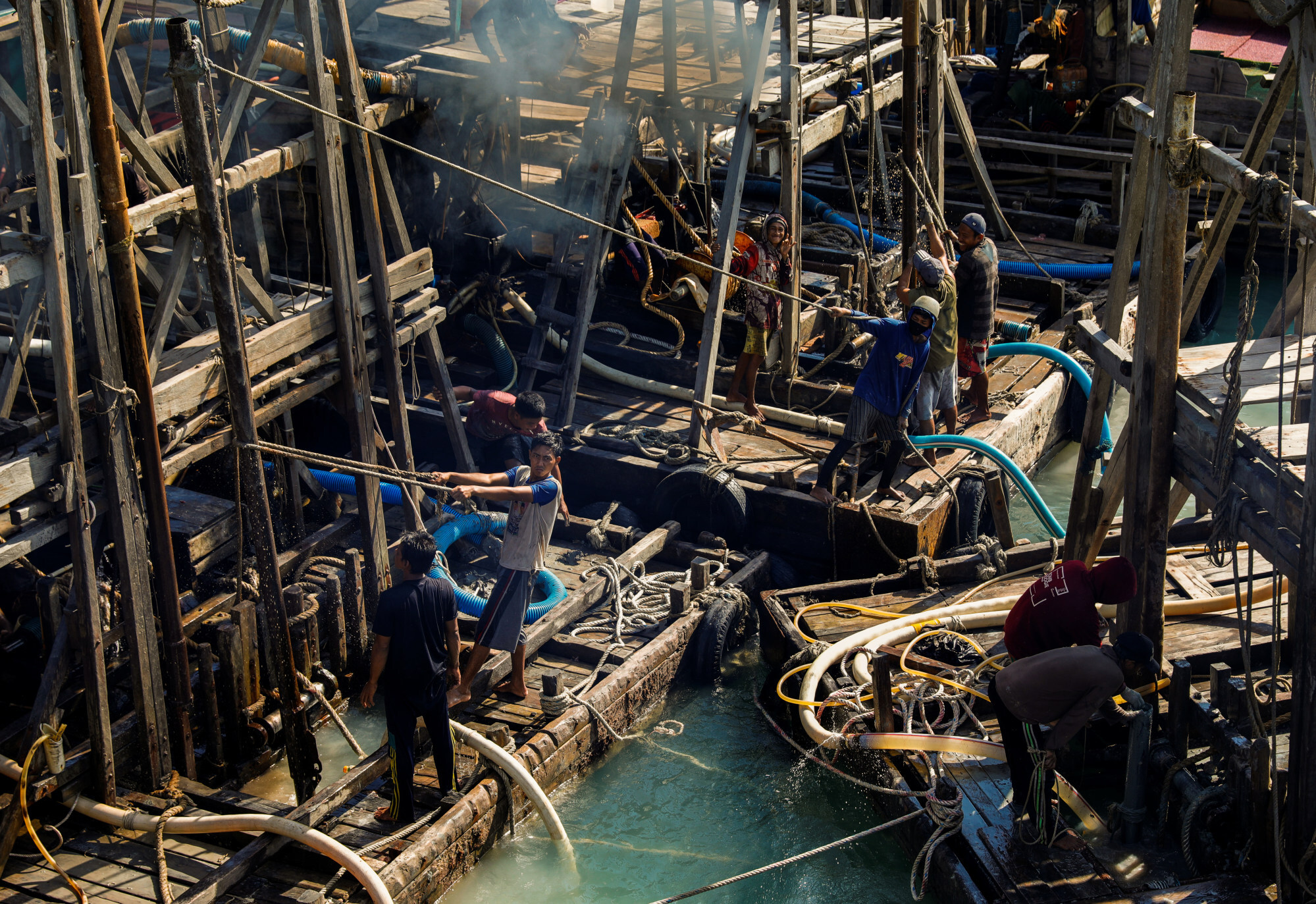
Indonesian politician’s mid-flight death sparks probe, casts spotlight on threats to environmental activists
- Helmud Hontong, the Vice-Regent of the northern Sangihe Islands, bled from his mouth and nose during a 90-minute flight and was pronounced dead on arrival
- Police say based on the results of initial toxicology tests, Helmud’s cause of death was due to complications of chronic illness and heart failure
When Indonesian politician Helmud Hontong boarded a flight from Denpasar in Bali to the city of Makassar in South Sulawesi last week, he was in good spirits.
The Vice-Regent of the remote Sangihe Islands in North Sulawesi province was on his way home after a meeting with other local regents.
But less than an hour into the 90-minute Lion Air flight, Helmud complained he was feeling faint, according to one of his aides. He then started to cough violently, as blood began to pour from his mouth and nose. The 58-year-old was declared dead on arrival when the plane landed in Makassar.
Indonesia’s clean energy dream: a victim of coronavirus, or politics?
The incident has ignited a firestorm in Indonesia, with environmental groups and the human rights commission calling for an investigation into the mysterious circumstances of Helmud’s untimely death.
In the media, some observers have speculated he could have been a target of foul play, given what they describe as a familiar pattern of violence against those who choose to defend environmental causes in Indonesia.
In recent years, there has been an increasing level of threat against those working on environment and land rights issues
Usman Hamid, director of Amnesty Indonesia, said he had mobilised senior activists to push for a full autopsy and forensic investigation.
“In recent years, there has been an increasing level of threat against those working on environment and land rights issues,” Usman said. “The way he died reminded me of Munir, my fellow human rights activist who was poisoned on a plane.”
Munir Said Thalib, one of Indonesia’s most prominent human rights activists, was poisoned with arsenic and died aboard a Garuda Indonesia flight from Jakarta to Amsterdam in 2004.

Former pilot Pollycarpus Budihari Priyanto was originally found guilty of Munir’s murder in 2005, but since the conviction was overturned, allegations of a cover-up have continued to haunt the case.
Helmud had opposed a 42,000 hectare gold mine concession granted by the central government to Indonesian firm PT Tambang Mas Sangihe, which is 70 per cent owned by Canadian firm Baru Gold and the rest by combined interests, according to Baru Gold’s website.
On April 28, Helmud sent a letter to the Ministry of Energy and Mineral Resources asking that the mine’s operational permit be revoked over the environmental destruction it would cause.
In a press release this week responding to coverage of Helmud’s death, Baru Gold referenced “unfounded allegations” made against it and pointed out that the Sangihe project had not yet started construction and it was therefore impossible for the company to have caused any environmental damage.
The Sangihe Islands Regency, in north Indonesia, has a population of some 140,000 residents. Due to its volcanic and mountainous landscape, the soil there is especially fertile and the area also enjoys a strong fishing industry.
Mineral and coal mining are also significant industries in Indonesia and, according to the Indonesian National Bureau of Statistics, contributed over 16 billion rupiah (US$1.1 million) to the economy in 2017, resulting in a collision of agendas in recent years between exploiting Indonesia’s natural resources and the risks that such work would bring to human populations and the environment.
The North Sulawesi Police said that based on the results of initial toxicology tests, Helmud’s cause of death was not due to poison as some had speculated, but rather from complications of chronic illness. The results of a full autopsy are pending.

Merah Johansyah, the National Coordinator of the Mining Advocacy Network (Jatam) said it was not possible to come to any conclusions ahead of full autopsy results “but the public is asking if there is a connection between his death and his opposition to the gold mine, and it is a good question when you consider the context”.
“There is a very real issue about the kinds of conditions that people are facing in mining areas in Indonesia,” he said.
Islam’s role in Indonesia’s environmental fight
Ariefsyah Nasution, a campaigner at Greenpeace Indonesia, said that “it is undeniable that attempts to silence, intimidate and criminalise residents and activists who are against mining industry activities or the extractive industries and natural resource exploitation are common practices and are increasingly being carried out by corporations and their supporters”.
Ariefsyah referred to anti-mining activist Salim Kancil, who was beaten to death in East Java in 2015, pointing out that assaults of this kind were often carried out by unknown third parties, making provable links to mining industries difficult.
That same year, fellow WALHI activist Murdani’s house was burned down in Central Lombok with his family inside, although they escaped unharmed.
In cases where environmental defenders are not threatened physically, they may face other forms of intimidation including legal action in Indonesia.
Every year, Jatam gets more and more reports of threats made against those who speak out
“The mining industry in Indonesia is known for being corrupt and aggressive,” Merah said.
“Usually the mining industry takes one of two routes if challenged. Either they use dirty tricks like falsifying documents or manipulating regulations, or they go after anyone who opposes them,” he said.
“They will use anything from online attacks like hacking social media or doxxing to try and ruin someone’s reputation, to threats of violence and physical attacks. Every year, Jatam gets more and more reports of threats made against those who speak out,” he added.
In 2018, environmental activist Heri Budiawan, better known as Budi Pego, was sentenced to 10 months in prison for crimes against state security, after Indonesian authorities charged him under anti-communist articles in the Indonesian criminal code in the first case of its kind since the fall of former president Suharto in 1998.
Death of lawyer fighting Chinese-funded Indonesian dam casts shadow over project
Heri had apparently “promoted pro-communist” ideology after he displayed a hammer and sickle symbol while protesting against a gold mine in East Java, and his imprisonment was widely condemned by human rights groups, which accused the authorities of criminalising activists while turning a blind eye to the alleged illegal activities of the mining industries.
Baru Gold, in its June 17 press release, said there were illegal miners on the islands who tended not to be residents of Sangihe. They were the ones polluting the environment, the company alleged, “including dumping their mine tailings into the ocean on the reefs, destroying the mangroves, and polluting the river and ocean with mercury”.
It also claimed it was “not aware of any local residents opposed to the project”.
“In fact, the company enjoys remarkably strong support from both the islanders of Sangihe, who are hoping for a better and safer economic environment, and the local government that is actively supporting their aspirations,” it said.
While it may be some time before police complete a full investigation into Helmud’s death, which may still fail to satisfy those demanding answers, the residents of the Sangihe Islands are determined to honour the memory of the Vice-Regent, according to Merah.
“The people of Sangihe are in deep mourning and have been flying flags at half mast across the islands,” he said. “They consider the Vice-Regent a hero for standing up to the gold mine.”

